Lawrence Block's Blog, page 14
December 21, 2016
One Painting from Edward Hopper. 1000 words from JoeLansdale.
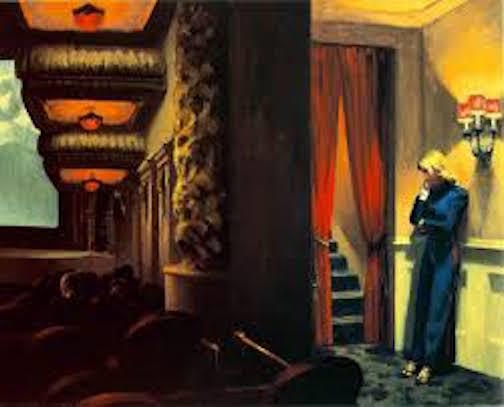
THE PROJECTIONIST
by Joe R. Lansdale
There’s some that think I got it easy on the job, but they don’t know there’s more to it than plugging in the projector. You got to be there at the right time to change reels, and you got to have it set so it’s seamless, so none of the movie gets stuttered, you know. You don’t do that right, well, you can cause a reel to flap and there goes the movie right at the good part, or it can get hung up and the bulb will burn it. Then everyone down there starts yelling, and that’s not good for business, and it’s not good for you, the boss hears about it, and with the racket they make when the picture flubs, he hears all right.
I ain’t had that kind of thing happen to me much, two or three times on the flapping, once I got a burn on a film, but it was messed up when we got it. Was packed in wrong and got a twist in it I couldn’t see when I pulled it out. That wasn’t my fault. Even the boss could see that.
Still, you got to watch it.
It ain’t the same kind of hard work as digging a ditch, which I’ve done, on account of I didn’t finish high school. Lacked a little over a year, but I had to drop out on account of some things. Not a lot of opportunities out there if you don’t have that diploma.
Anyways, thought I’d go back someday, take a test, get the diploma, but I didn’t. Early on, though, I’d take my little bit of earnings and go to the picture show. There was old man, Bert, working up there, and I knew him a because he knew my dad, though not in a real close way. I’d go up there and visit with him. He’d let me in free and I could see the movies from the projection booth. Bert was a really fine guy. He had done some good things for me. I think of him as my guardian angel. He gave me my career.
While I was there, when I’d seen the double feature and it was time for it to start over, he’d show me how the projection was done. So when Bert decided he was going to hang it up, live on his social security, I got the job. I was twenty-five. I been at it for five years since then.
One nice thing is I get to watch movies for free, though some of them, once was enough. If I ever have to see Seven Brides for Seven Brothers again, I may cry myself into a stupor. I don’t like those singing movies much.
Even if you wasn’t looking at the picture, you had to hear the words from them over and over, and if the picture was kept over a week, you could pretty much say all the stuff said in the movie like you was a walking record. I tried some of the good lines the guys said to the girls in movies, the pick up lines, but none of them worked for me.
I ain’t handsome, but I’m not scary looking either, but the thing is, I’m not easy with women. I just ain’t. I never learned that. My father was quite the ladies man. Had black, curly hair and sharp features and bright blue eyes. Built up good from a lot physical work. He made the women swoon. Once he got the one he wanted, he’d grow tired of her, same as he did with my mother, and he was ready to move on. Yeah, he had the knack for getting them in bed and taking a few dollars from them. He was everything they wanted. Until he wasn’t.
He always said, “Thing about women, there’s one comes of age every day and there‘s some that ain’t of age, but they’ll do. All you got to do is flatter them. They eat that shit up. Next thing you know, you got what you really want, and there‘s new mountains to conquer.”
Dad was that kind of fellow.
Bert always said, “Guy like that who can talk a woman out of her panties pretty easy, gets to thinking that’s what it’s all about. That there’s nothing else to it. It ought not be like that. Me and Missy, we been married fifty years, and when it got so neither one of us was particularly in a hurry to see the other without drawers, we still wanted to see each other at the breakfast table.”
That was Bert’s advice on women in a nutshell.
Well, there was another thing. He always said, “Don’t sit around trying to figure what she’s thinking, cause you can’t. And when it comes right down to it, she don’t know what you’re thinking. Just be there for one another.”
Thing was though, I never had anyone to be there for. I think it’s how I carry myself. Bert always said, “Stand up, Cartwright. Quit stooping. You ain’t no hunchback. Make eye contact, for Christ‘s sake.”
I don’t know why I do that, stoop, I mean, but I do. Maybe it’s because I’m tall, six-six, and thin as a blade of grass. It’s a thing I been trying to watch, but sometimes I feel like I got the weight of memories on my shoulders.
The other night Mr. Lowenstein hired a new usherette. She is something. He has her wear red. Always red. The inside of the theater has a lot of red. Backs of the seats are made out of some kind of red cloth. Some of the seats have gotten kind of greasy over time, young boys with their hair oil pressed into them. The curtains that pull in front of the stage, they’re red. I love it when they’re pulled, and then they open them so I can play the picture. I like watching them open. It gets to me, excites me in a funny way. I told Bert that once, thinking maybe he’d laugh at me, but he said, “Me too, kid.”
They have clowns and jugglers and dog acts and shitty magicians and such on Saturday mornings before the cartoons. They do stuff up there on the stage and the kids go wild, yelling and throwing popcorn and candy.
Now and again, a dog decides to take a dump on the stage, or one of the clowns falls off his bike and does a gainer into the front row, or maybe a juggler misses a toss and hits himself in the head. Kids like that even better. I think people are kind of strange when you get right down to it, cause everything that’s funny mostly has to do with being embarrassed or hurt, don’t you think?
##
Pick up In Sunlight or in Shadow to read the rest of "The Projectionist," along with 16 other Hopper-inspired stories. For more of Joe Lansdale's work, two current choices are Paradise Sky and Honky Tonk Samurai. A new Hap-and-Leonard novel, Coco Butternut, is available for pre-order.
One Painting from Edward Hopper. 1000 words from Joe Lansdale.
Edward Hopper painted “New York Movie” in 1939; three-quarters of a century later, Pegasus picked it for the cover of In Sunlight or in Shadow. Joe Lansdale doesn’t specify the town in which “The Projectionist” takes place. It could be set almost anywhere, and could take place at almost any time.
[image error]
THE PROJECTIONIST
by Joe R. Lansdale
There���s some that think I got it easy on the job, but they don���t know there���s more to it than plugging in the projector. You got to be there at the right time to change reels, and you got to have it set so it���s seamless, so none of the movie gets stuttered, you know. You don���t do that right, well, you can cause a reel to flap and there goes the movie right at the good part, or it can get hung up and the bulb will burn it. Then everyone down there starts yelling, and that���s not good for business, and it���s not good for you, the boss hears about it, and with the racket they make when the picture flubs, he hears all right.
I ain���t had that kind of thing happen to me much, two or three times on the flapping, once I got a burn on a film, but it was messed up when we got it. Was packed in wrong and got a twist in it I couldn���t see when I pulled it out. That wasn���t my fault. Even the boss could see that.
Still, you got to watch it.
It ain���t the same kind of hard work as digging a ditch, which I���ve done, on account of I didn���t finish high school. Lacked a little over a year, but I had to drop out on account of some things. Not a lot of opportunities out there if you don���t have that diploma.
Anyways, thought I���d go back someday, take a test, get the diploma, but I didn���t. Early on, though, I���d take my little bit of earnings and go to the picture show. There was old man, Bert, working up there, and I knew him a because he knew my dad, though not in a real close way. I���d go up there and visit with him. He���d let me in free and I could see the movies from the projection booth. Bert was a really fine guy. He had done some good things for me. I think of him as my guardian angel. He gave me my career.
While I was there, when I���d seen the double feature and it was time for it to start over, he���d show me how the projection was done. So when Bert decided he was going to hang it up, live on his social security, I got the job. I was twenty-five. I been at it for five years since then.
One nice thing is I get to watch movies for free, though some of them, once was enough. If I ever have to see Seven Brides for Seven Brothers again, I may cry myself into a stupor. I don���t like those singing movies much.
Even if you wasn���t looking at the picture, you had to hear the words from them over and over, and if the picture was kept over a week, you could pretty much say all the stuff said in the movie like you was a walking record. I tried some of the good lines the guys said to the girls in movies, the pick up lines, but none of them worked for me.
I ain���t handsome, but I���m not scary looking either, but the thing is, I���m not easy with women. I just ain���t. I never learned that. My father was quite the ladies man. Had black, curly hair and sharp features and bright blue eyes. Built up good from a lot physical work. He made the women swoon. Once he got the one he wanted, he���d grow tired of her, same as he did with my mother, and he was ready to move on. Yeah, he had the knack for getting them in bed and taking a few dollars from them. He was everything they wanted. Until he wasn���t.
He always said, ���Thing about women, there���s one comes of age every day and there���s some that ain���t of age, but they���ll do. All you got to do is flatter them. They eat that shit up. Next thing you know, you got what you really want, and there���s new mountains to conquer.���
Dad was that kind of fellow.
Bert always said, ���Guy like that who can talk a woman out of her panties pretty easy, gets to thinking that���s what it���s all about. That there���s nothing else to it. It ought not be like that. Me and Missy, we been married fifty years, and when it got so neither one of us was particularly in a hurry to see the other without drawers, we still wanted to see each other at the breakfast table.���
That was Bert���s advice on women in a nutshell.
Well, there was another thing. He always said, ���Don���t sit around trying to figure what she���s thinking, cause you can���t. And when it comes right down to it, she don���t know what you���re thinking. Just be there for one another.���
Thing was though, I never had anyone to be there for. I think it���s how I carry myself. Bert always said, ���Stand up, Cartwright. Quit stooping. You ain���t no hunchback. Make eye contact, for Christ���s sake.���
I don���t know why I do that, stoop, I mean, but I do. Maybe it���s because I���m tall, six-six, and thin as a blade of grass. It���s a thing I been trying to watch, but sometimes I feel like I got the weight of memories on my shoulders.
The other night Mr. Lowenstein hired a new usherette. She is something. He has her wear red. Always red. The inside of the theater has a lot of red. Backs of the seats are made out of some kind of red cloth. Some of the seats have gotten kind of greasy over time, young boys with their hair oil pressed into them. The curtains that pull in front of the stage, they���re red. I love it when they���re pulled, and then they open them so I can play the picture. I like watching them open. It gets to me, excites me in a funny way. I told Bert that once, thinking maybe he���d laugh at me, but he said, ���Me too, kid.���
They have clowns and jugglers and dog acts and shitty magicians and such on Saturday mornings before the cartoons. They do stuff up there on the stage and the kids go wild, yelling and throwing popcorn and candy.
Now and again, a dog decides to take a dump on the stage, or one of the clowns falls off his bike and does a gainer into the front row, or maybe a juggler misses a toss and hits himself in the head. Kids like that even better. I think people are kind of strange when you get right down to it, cause everything that���s funny mostly has to do with being embarrassed or hurt, don���t you think?
##
Pick up In Sunlight or in Shadow to read the rest of “The Projectionist,” along with 16 other Hopper-inspired stories. For more of Joe Lansdale’s work, two current choices are Paradise Sky and Honky Tonk Samurai. A new Hap-and-Leonard novel, Coco Butternut, is available for pre-order.
December 20, 2016
One Painting from Edward Hopper. 1000 Words from Jill Block. (Plus a video...)

THE STORY OF CAROLINE
By Jill D. Block
HANNAH
Once I decided it was finally time to look, it really wasn’t so hard to find her. After so much anticipation, having prepared myself for the frustrations and disappointments, the false leads, dead ends and wasted money that I assumed were inevitable, it actually took me less than a month. Massachusetts’ open adoption laws helped, and I made some lucky guesses. And then Google and Facebook helped bring it home.
The hard part was figuring out how I was going to get close to her, close enough to look into her eyes, to hear her voice. I wasn’t looking for a big emotional reunion. I certainly didn’t want or expect to forge a relationship at this late date. I didn’t even intend to let her know who I am. This isn’t about her, and I’m not here to answer her questions. I mean, if she was so interested in knowing who I am, she could have looked for me, right?
That sounds like I am mad at her for having given me away. But I’m not. All I really mean is that I don’t assume she has any interest in knowing what became of me. And that’s ok. Look, I’m almost 40 years old. I get it. I learned a long time ago that you can’t blame someone for not loving you.
She was sixteen when she had me. So pretty much wherever I ended up was going to be better than with her, right? And it was fine. The people who raised me, my parents, were perfectly nice, well-meaning people. They were older, in their forties, when they got me, and they took me into their home and made me a part of their family. Well, sort of. Looking back, it seems like once they got me they couldn’t quite remember why they’d bothered. Let’s just say, there was not a lot of love in that house. They raised me, gave me shelter, food and clothes and an education. I know exactly what they did for me, and I appreciate it. Lots of kids grow up with a lot less than I had. But now I need to see what I’d missed.
GRACE
She sat at the kitchen table and listened to him breathing in the next room. She took a sip of coffee. Cold. She should be in there with him. She should be cherishing this time, spending these final days with him, these final moments. She knew that there would come a day, soon, when she wouldn’t remember what kept her paralyzed in here, in this room, when she could have been by his side, and she would be left with nothing but regret.
Missy and Jane had decided when he came home from the hospital that he should be down here, in the family room, and not in the bedroom upstairs. They’d come roaring in like a storm, waving cellphones and Starbucks cups, throwing open the windows, unpacking groceries, rearranging furniture, directing the guys who delivered the bed, acting like they own the place. Like they live here. Like this was their problem to solve. When she brought him home, they sat with him, sometimes together, sometimes taking turns, holding his hand, smoothing his hair, speaking softly to him, kissing his forehead. And then, blinking back their tears, telling her they’d be back soon, they got in their cars and they left.
That was two days ago. Since then, she’d mostly sat here, at the kitchen table, drinking coffee and listening to him breathe. Aside from the feedings every few hours, when she busied herself with detached efficiency, mixing and measuring, chirping and clucking like an idiotic bird, asking him questions she knew he wouldn’t answer, she couldn’t bear to be in the room with him.
The one-sided conversations don’t really bother her. She is used to it. He hasn’t been able to speak for more than two years, not since the last big surgery. He’d tried in the beginning. He would say something, and she would guess, trying to understand what he was saying. She had about as much success as she would have had having a conversation with the cat. They sometimes laughed about it, back when it still felt like they were in this together.
Eventually, they stopped trying. After repeating himself three or four times, and shaking his head no to each of her guesses, he’d dismiss her with a wave of his hand, never mind, and turn back to the newspaper. That was when she felt most like she was failing him. If their bond was really so deep, shouldn’t his words be able to reach her?
If it was important enough, he would write her a note. The house was filled with his notebooks, their spirals crushed, and the pencils he used, sharpened with a knife. What would she do with the notebooks when he was gone? She wondered if the girls would want them. They probably imagined that they would find them full of poetic declarations of love, essays on the singular joy he’d known being their father. In fact, they were mostly reminders of things she needed to pick up at the store. Q-tips and Kitty Litter.
There had been fewer and fewer notes the last few months before he’d gone into the hospital. He responded to her questions with a thumbs up or down, the occasional shrug (which she took to mean “I don’t know” or “I don’t care,” depending on her mood), raised eyebrows (“really?”) or a smile. There hadn’t been many smiles lately.
José had told her he would come everyday, that he would bathe him, and change the bed. He told her he had put a box of medications in the refrigerator, that she could administer as needed, and he stuck a note to the door with a magnet. He left her with a stack of pamphlets, and said that he would arrange for a volunteer to come by every few days.
HANNAH
My plan had been to show up at the gallery where she worked. I figured I would recognize her from her Facebook pictures, and I could just say I was new in town, act confused and ask for directions or something. I would be gone before she noticed if anything I said didn’t make sense...
##
You can read the rest of Jill's story, and sixteen others, in In Sunlight or in Shadow . In a year or two, if all goes well, you may be able to read the novel on which she's currently at work. For now, here's a short video , filmed at the recent ISOIS launch at the Whitney Museum, in which she talks about "The Story of Caroline."
One painting from Edward Hopper. 1000 words from Jill Block. (Plus a video…)
Jill D. Block, who by the sheerest coincidence bears the same surname as the editor of In Sunlight or in Shadow, wrote several promising short stories while in college at Clark University. She went on to a career in corporate real estate law, until an interfering relative suggested there was no need to confine her fiction to legal briefs. Her first story appeared in Ellery Queen’s Mystery Magazine, her second in the Three Rooms Press anthology, Dark City Lights. This, her third, was inspired by Edward Hopper’s 1947 painting, “Summer Evening.”
[image error]
THE STORY OF CAROLINE
By Jill D. Block
HANNAH
��Once I decided it was finally time to look, it really wasn���t so hard to find her. After so much anticipation, having prepared myself for the frustrations and disappointments, the false leads, dead ends and wasted money that I assumed were inevitable, it actually took me less than a month. Massachusetts��� open adoption laws helped, and I made some lucky guesses. And then Google and Facebook helped bring it home.
��The hard part was figuring out how I was going to get close to her, close enough to look into her eyes, to hear her voice. I wasn���t looking for a big emotional reunion. I certainly didn���t want or expect to forge a relationship at this late date. I didn���t even intend to let her know who I am. This isn���t about her, and I���m not here to answer her questions. I mean, if she was so interested in knowing who I am, she could have looked for me, right?
That sounds like I am mad at her for having given me away. But I���m not. All I really mean is that I don���t assume she has any interest in knowing what became of me. And that���s ok. Look, I���m almost 40 years old. I get it. I learned a long time ago that you can���t blame someone for not loving you.
She was sixteen when she had me. So pretty much wherever I ended up was going to be better than with her, right? And it was fine. The people who raised me, my parents, were perfectly nice, well-meaning people. They were older, in their forties, when they got me, and they took me into their home and made me a part of their family. Well, sort of. Looking back, it seems like once they got me they couldn���t quite remember why they���d bothered. Let���s just say, there was not a lot of love in that house. They raised me, gave me shelter, food and clothes and an education. I know exactly what they did for me, and I appreciate it. Lots of kids grow up with a lot less than I had. But now I need to see what I���d missed.
GRACE
She sat at the kitchen table and listened to him breathing in the next room. She took a sip of coffee. Cold. She should be in there with him. She should be cherishing this time, spending these final days with him, these final moments. She knew that there would come a day, soon, when she wouldn���t remember what kept her paralyzed in here, in this room, when she could have been by his side, and she would be left with nothing but regret.
Missy and Jane had decided when he came home from the hospital that he should be down here, in the family room, and not in the bedroom upstairs. They���d come roaring in like a storm, waving cellphones and Starbucks cups, throwing open the windows, unpacking groceries, rearranging furniture, directing the guys who delivered the bed, acting like they own the place. Like they live here. Like this was their problem to solve. When she brought him home, they sat with him, sometimes together, sometimes taking turns, holding his hand, smoothing his hair, speaking softly to him, kissing his forehead. And then, blinking back their tears, telling her they���d be back soon, they got in their cars and they left.
That was two days ago. Since then, she���d mostly sat here, at the kitchen table, drinking coffee and listening to him breathe. Aside from the feedings every few hours, when she busied herself with detached efficiency, mixing and measuring, chirping and clucking like an idiotic bird, asking him questions she knew he wouldn���t answer, she couldn���t bear to be in the room with him.
The one-sided conversations don���t really bother her. She is used to it. He hasn���t been able to speak for more than two years, not since the last big surgery. He���d tried in the beginning. He would say something, and she would guess, trying to understand what he was saying. She had about as much success as she would have had having a conversation with the cat. They sometimes laughed about it, back when it still felt like they were in this together.
Eventually, they stopped trying. After repeating himself three or four times, and shaking his head no to each of her guesses, he���d dismiss her with a wave of his hand, never mind, and turn back to the newspaper. That was when she felt most like she was failing him. If their bond was really so deep, shouldn���t his words be able to reach her?
If it was important enough, he would write her a note. The house was filled with his notebooks, their spirals crushed, and the pencils he used, sharpened with a knife. What would she do with the notebooks when he was gone? She wondered if the girls would want them. They probably imagined that they would find them full of poetic declarations of love, essays on the singular joy he���d known being their father. In fact, they were mostly reminders of things she needed to pick up at the store. Q-tips and Kitty Litter.
There had been fewer and fewer notes the last few months before he���d gone into the hospital. He responded to her questions with a thumbs up or down, the occasional shrug (which she took to mean ���I don���t know��� or ���I don���t care,��� depending on her mood), raised eyebrows (���really?���) or a smile. There hadn���t been many smiles lately.
Jos�� had told her he would come everyday, that he would bathe him, and change the bed. He told her he had put a box of medications in the refrigerator, that she could administer as needed, and he stuck a note to the door with a magnet. He left her with a stack of pamphlets, and said that he would arrange for a volunteer to come by every few days.
HANNAH
��My plan had been to show up at the gallery where she worked. I figured I would recognize her from her Facebook pictures, and I could just say I was new in town, act confused and ask for directions or something. I would be gone before she noticed if anything I said didn���t make sense…
##
You can read the rest of Jill’s story, and sixteen others, in In Sunlight or in Shadow. In a year or two, if all goes well, you may be able to read the novel on which she’s currently at work. For now, here’s a short video, filmed at the recent ISOIS launch at the Whitney Museum, in which she talks about “The Story of Caroline.”
December 18, 2016
More Gifts for Giving and Getting!
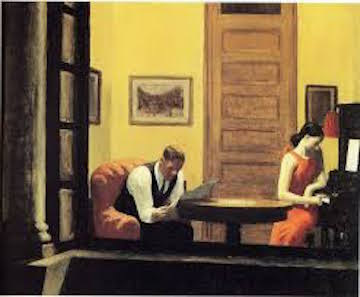
...and we'll start with Room in New-York, the Edward Hopper painting that inspired Stephen King to write "The Music Room." Lately I've been serving up paintings, along with 1000-word samples of the stories that arose from them (because, duh, that's what a picture's worth, right?) and you're invited to check out the entries to date—Robert Olen Butler, Kris Nelscott, Michael Connelly, Megan Abbott, Craig Ferguson, Gail Levin, and did I mention Stephen King?
I'm sure my perspective's skewed, but I can't think of a better gift this season than In Sunlight or in Shadow—and neither apparently can the print and online reviewers assembling their annual Best Gift Book lists. This delights me, and continues to raise the spirits of the good people at
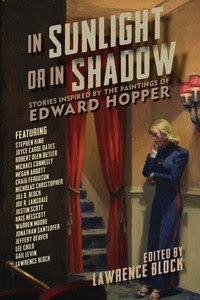 Pegasus Books, but when I write about it here I'm afraid I might be preaching to the choir. Because you've already grabbed up copies for all of the best people on your Christmas list, haven't you? And of course you've already ordered your copy of ISOIS, and may well have read half the stories by now.
Pegasus Books, but when I write about it here I'm afraid I might be preaching to the choir. Because you've already grabbed up copies for all of the best people on your Christmas list, haven't you? And of course you've already ordered your copy of ISOIS, and may well have read half the stories by now.Um, I've been meaning to order, but this is such a busy time...
I know what you mean, and Im certainly not about to scold you. OTOH, you're costing yourself money. Amazon's pre-order price was a mere $19.70, and they've since hiked it all the way up to $20.09. Yes, I know, that's only 29¢, but time is money, isn't it? No need to squander any more of either one. Place your order now. Go ahead, I can wait. I've got nothing but time.
Okay, that's done.
And I'm sure you feel better for it. But here's my dilemma: What's the perfect gift for the person who's already received a copy of ISOIS? I picked up the book and started paging through it, and got an answer as soon as I hit the table of contents.
Seventeen stories by seventeen writers. Hmmm. What else have they written?
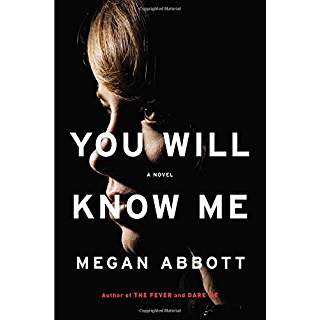 Megan Abbott. Her newest, You Will Know Me, is on a batch of Best-of-2016 lists. Backlist titles include Dare Me and The Fever.
Megan Abbott. Her newest, You Will Know Me, is on a batch of Best-of-2016 lists. Backlist titles include Dare Me and The Fever.Jill D. Block's first story sold to EQMM. Her second's in Dark City Lights. And she's working on her first novel.
Robert Olen Butler. His new novel is Perfume River, and it's on my list. Writers will welcome his From Where You Dream: The Process of Writing Fiction.
Lee Child. His brand-new Jack Reacher novel is Night School. Astonishingly, it's #21 in the series; if you're new to Reacher, you can start at the beginning.
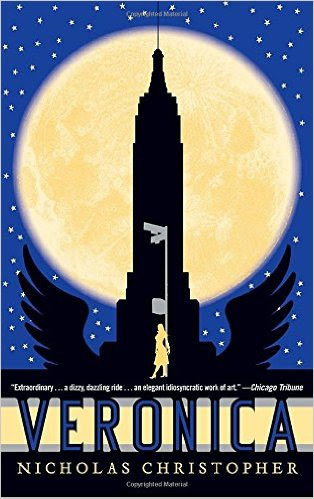 Nicholas Christopher. I suppose Magic Realism will do for a label, but Nic's work defies categorization. I particularly enjoyed his novel A Trip to the Stars; he's a poet as well, most recently with On Jupiter Place.
Nicholas Christopher. I suppose Magic Realism will do for a label, but Nic's work defies categorization. I particularly enjoyed his novel A Trip to the Stars; he's a poet as well, most recently with On Jupiter Place.Michael Connelly. Here's the new Harry Bosch: The Wrong Side of Goodbye. Grab it. Or, if you've unaccountably missed the series until now, start with The Black Echo.
Jeffery Deaver. I know to expect trickery in Jeff's books, and yet I never quite see it coming. Latest Lincoln Rhyme is The Skin Collector, latest Kathryn Dance is Solitude Creek.
Craig Ferguson. You thought he was merely a stand-up comedian, a TV host, and a Renaissance man. He's also a novelist—Between the Bridge and the River—and a memoirist—American on Purpose. Now you know.
Stephen King. End of Watch, third book in the Bill Hodges trilogy, came out this year. The earlier volumes are Mr. Mercedes and Finders Keepers.
 Joe R. Lansdale. The TV series Hap and Leonard is bringing well-deserved attention to the books. Savage Season is where it begins; Honky Tony Samurai's the most recent.
Joe R. Lansdale. The TV series Hap and Leonard is bringing well-deserved attention to the books. Savage Season is where it begins; Honky Tony Samurai's the most recent.Gail Levin's sole work of fiction to date is her story in ISOIS. But she's the reigning authority on Edward Hopper and his work, and this blog post concludes with a list of her books about the artist. And no coffee table should be without her new book, Theresa Bernstein: A Century in Art.
Warren Moore came to New York for the two ISOIS signings at The Whitney Museum and the Mysterious Bookshop, then returned to South Carolina and his day job at Newberry College. His novel is Broken Glass Waltzes, and he has a story in Dark City Lights.
Kris Nelscott is one of several aspects of Kristine Kathryn Rusch, who publishes abundantly in many genres. As Nelscott, she's most recently brought out Street Justice, 7th in her Smokey Dalton series; writers will
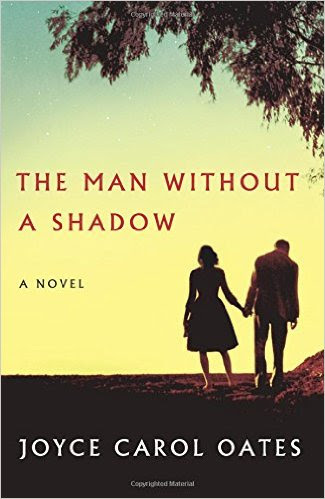 appreciate her Closing the Deal...on Your Terms: Agents, Contracts, and Other Considerations.
appreciate her Closing the Deal...on Your Terms: Agents, Contracts, and Other Considerations.Joyce Carol Oates. Recent books include The Man Without a Shadow and The Doll-Master and Other Tales of Terror. Writers will find much to relate to in Soul at the White Heat: Inspiration, Obsession, and the Writing Life. And it's not too early to pre-order A Book of American Martyrs, a new novel due February 7.
Jonathan Santlofer edited The Marijuana Chronicles; his novels include The Murder Notebook and The Death Artist, and he too has a story in Dark City Lights.
Justin Scott. The Gangster is the most recent Isaac Bell historical adventure, which Scott co-writes with Clive Cussler; The Shipkiller is Justin's classic maritime thriller.
That's some crew. How'd you get people like that to write for you?
I'd love to take the credit, but it really belongs to Hopper. The writers agreed to be in the book because they love the paintings.
So why don't I recommend a couple of Hopperesque items? Ideal auxiliary gifts for people who own In Sunlight or in Shadow—or for yourself, as far as that goes...
Edward Hopper, edited by Tomas Llorens and Didier Ottinger.
Edward Hopper's New York, by Avis Berman.
Edward Hopper: A Book of Postcards
Edward Hopper 2017 Wall Calendar
There's more, including this coffee mug, but for further inquiry I'm afraid you're on your own.
And now it's time for some gifts from me to you.
Oh, goody! Yay! Yippee! You're going to give stuff away for free!
Well, not exactly.
 But didn't you just say—
But didn't you just say—Don't tell me what I said. I know what I said. I said "gifts." I didn't say "free." I figure marking a book all the way down to 99¢ makes it a gift, even if it's not technically free.
And for all these years, whenever I saw the phrase "free gift" I thought it was redundant. Oh well. You might as well tell me what these so-called gifts are, and how to get them.
Why not, since you ask so graciously? First are two early novels from my Collection of Classic Erotica, Campus Tramp and 21 Gay Street. Then there's a novella, Keller's Adjustment, and a pair of Classic Crime Library mysteries, Cinderella Sims and You Could Call It Murder. Next up is Eros & Capricorn, #1 in John Warren Wells' Sexual Behavior series.
 And, finally, a short story collection, Catch and Release. They're all 99¢ apiece, from now until Christmas morning, when they all pumpkin back to their original prices.
And, finally, a short story collection, Catch and Release. They're all 99¢ apiece, from now until Christmas morning, when they all pumpkin back to their original prices.And I suppose they're all exclusively available on Kindle, and only in the United States. Right?
If I remember correctly, you're in Lost Elephant, Montana, so that shouldn't pose a problem. But they're also available for 99p via amazon.co.uk at these links: Campus Tramp - 21 Gay Street - Keller's Adjustment - Cinderella Sims - You Could Call It Murder - Eros & Capricorn - Catch and Release
I think that'll do it for now, and I'll wrap this up and let you get busy clicking and shopping, and—
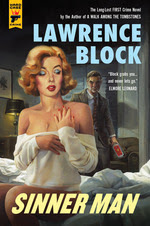 Hey, wait a minute. There's something wrong.
Hey, wait a minute. There's something wrong.There is?
You left something out.
I did?
You listed 16 ISOIS authors and suggested books of theirs. But there are 17 stories in the book, and who do you suppose you left out?
Whom.
Don't be a bloody pedant. You've got a story of your own in there, "Autumn at the Automat," and you left yourself out! How could you be so absent-minded?
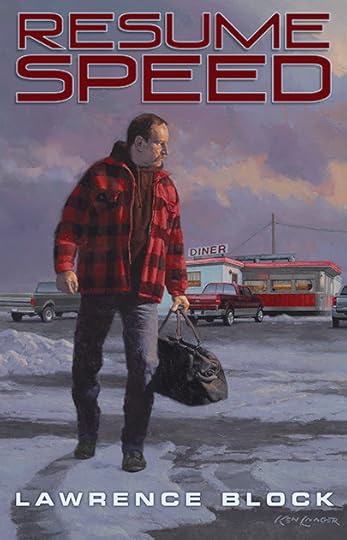 I was trying for modesty, or at least the appearance of modesty, but the hell with it. If I were inclined to tout some of my own work, I'd mention Sinner Man and Resume Speed, both of them out this month. There. I hope you're happy.
I was trying for modesty, or at least the appearance of modesty, but the hell with it. If I were inclined to tout some of my own work, I'd mention Sinner Man and Resume Speed, both of them out this month. There. I hope you're happy.In fact I hope all of y'all are happy, and that this holiday season flows into a good year for each and every one of us. That may seem like too much to hope for, but I figure if we can harness the power of diminished expectations, we ought to come out all right.
Cheers,

PS: As always, please feel free to forward this to anyone you think might find it of interest. And, if you've received the newsletter in that fashion from a friend and would like your own subscription, that's easily arranged; a blank email to lawbloc@gmail.com with Newsletter in the subject line will get the job done.
LB's Blog and Website
LB's Facebook Fan Page
Twitter: @LawrenceBlock
December 16, 2016
One Painting from Edward Hopper. 1000 Words from Stephen King.
"I’m saying no to almost everything," he replied, "but I’m going to table this for a bit instead of saying 'No' outright, because I love Hopper." We agreed that I could list him as a "definite remote possibility," and a few emails later he chose the painting he probably wouldn't find time to write about: "There’s a painting, 'Room in New-York.' I have a repro of it in my house, because it speaks to me."
A couple of months later, he gave it a voice we can all hear.
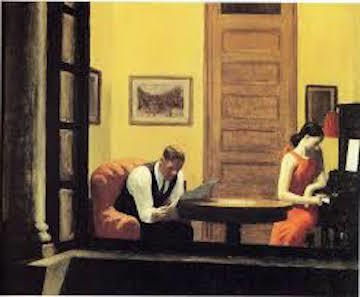
THE MUSIC ROOM
By Stephen King
The Enderbys were in their music room—so they called it, although it was really just the spare bedroom. Once they had thought it would be little James or Jill Enderby’s nursery, but after ten years of trying, it seemed increasingly unlikely that a Baby Dear would arrive out of the Nowhere and into the Here. They had made their peace with childlessness. At least they had work, which was a blessing in a year when men were still standing in breadlines. There were fallow periods, it was true, but when the job was on, they could afford to think of nothing else, and they both liked it that way.
Mr. Enderby was reading The New York Journal-American, a new daily not even halfway through its first year of publication. It was sort of a tabloid and sort of not. He usually began with the comics, but when they were on the job he turned to the city news first, scanning through the stories quickly, especially the Police Blotter.
Mrs. Enderby sat at the piano, which had been a wedding gift from her parents. Occasionally she stroked a key, but did not press any. Tonight the only music in the music room was the symphony of nighttime traffic on Third Avenue, which came in through the open window. Third Avenue, third floor. A good apartment in a sturdy brownstone. They rarely heard their neighbors above and below, and their neighbors rarely heard them. Which was all to the good.
From the closet behind them came a single thump. Then another. Mrs. Enderby spread her hands as if to play, but when the thumps ceased, she put her hands in her lap.
“Still not a peep about our pal George Timmons,” Mr. Enderby said, rattling the paper.
“Perhaps you should check the Albany Herald,” she said. “I believe the newsstand on Lexington and 60th carries it.”
“No need,” he said, turning to the funnies at last. “The Journal-American is good enough for me. If Mr. Timmons has been reported missing in Albany, let those interested search for him there.”
“That’s fine, dear,” said Mrs. Enderby. “I trust you.” There was really no reason not to; to date, the work had gone swimmingly. Mr. Timmons was their sixth guest in the specially reinforced closet.
Mr. Enderby chuckled. “The Katzenjammer Kids are at it again. This time they’ve caught Der Captain fishing illegally—shooting a net from a cannon, in fact. It’s quite amusing. Shall I read it to you?”
Before Mrs. Enderby could answer, another thump came from the closet, and faint sounds that might have been shouts. It was difficult to tell, unless one put one’s ear right up against the wood, and she had no intention of doing that. The piano bench was as close to Mr. Timmons as she intended to get, until it was time to dispose of him. “I wish he’d stop.”
“He will, dear. Soon enough.”
Another thump, as if to refute this.
“That’s what you said yesterday.”
“It seems I was premature,” said Mr. Enderby, and then, “Oh, gosh—Dick Tracy is once more on the hunt for Pruneface.”
“Pruneface gives me the willies,” she said, without turning. “I wish Detective Tracy would put him away for good.”
“That will never happen, dear. People claim to root for the hero, but it’s the villains they remember.”
Mrs. Enderby made no reply. She was waiting for the next thump. When it came—if it came—she would wait for the one after that. The waiting was the worst part. The poor man was hungry and thirsty, of course; they had ceased feeding and watering him three days ago, after he had signed the last check, the one that emptied his account. They had emptied his wallet at once, of almost two hundred dollars. In a depression as deep as this one, two hundred was a jackpot, and his watch might add as much as twenty more to their earnings (although, she admitted to herself, that might be a trifle optimistic).
Mr. Timmons’s checking account at Albany National had been the real mother lode: eight hundred. Once he was hungry enough, he had been happy to sign several checks made out to cash and with the notation “Business Expenses” written in the proper spot on each one. Somewhere a wife and kiddies might be depending on that money when Father didn’t come home from his trip to New York, but Mrs. Enderby did not allow herself to dwell on that. She preferred to imagine Mrs. Timmons having a rich Mama and Papa in Albany’s Mansion District, a generous couple right out of a Dickens novel. They would take her in and care for her and her children, little boys who might be endearing scamps like Hans and Fritz, the Katzenjammer Kids.
“Sluggo broke a neighbor’s window and is blaming it on Nancy,” Mr. Enderby said with a chuckle. “I swear he makes the Katzenjammers look like angels!”
“That awful hat he wears!” Mrs. Enderby said.
Another thump from the closet, and a very hard one from a man who had to be on the verge of starvation. But Mr. Timmons had been a big one. Even after a generous dose of chloral hydrate in his glass of dinner wine, he had nearly overpowered Mr. Enderby. Mrs. Enderby had had to help. She sat on Mr. Timmons’s chest until he quieted. Unladylike, but necessary. That night, the window on Third Avenue had been shut, as it always was when Mr. Enderby brought home a guest for dinner. He met them in bars. Very gregarious, was Mr. Enderby, and very good at singling out businessmen who were alone in the city—fellows who were also gregarious and enjoyed making new friends. Especially new friends who might become new clients of one business or another. Mr. Enderby judged them by their suits, and he always had an eye for a gold watch chain.
“Bad news,” Mr. Enderby said, a frown creasing his brow.
She stiffened on the piano bench and turned to face him. “What is it?”
“Ming the Merciless has imprisoned Flash Gordon and Dale Arden in the radium mines of Mongo. There are these creatures that look sort of like alligators—”
Now from the closet came a faint, wailing cry...
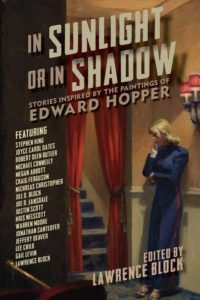 ##
##I hate to stop you there, but we've already gone a few sentences past the 1000-word mark. You can read the rest of Stephen's chilling story, and 16 other Hopper-inspired entries by Megan Abbott, Jill D. Block, Robert Olen Butler, Lee Child, Nicholas Christopher, Michael Connelly, Jeffery Deaver, Craig Ferguson, Joe R. Lansdale, Gail Levin, Warren Moore, Joyce Carol Oates, Kris Nelscott, Jonathan Santlofer, Justin Scott, and, um, Your Humble Editor. All the stories and all the paintings from which they blossomed are assembled in In Sunlight or in Shadow, and I commend them to your attention.
December 15, 2016
One Painting from Edward Hopper. 1000 Words from Gail Levin.
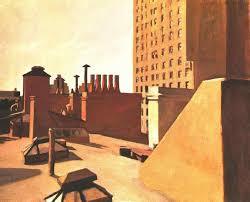
THE PREACHER COLLECTS
by Gail Levin
They call me “Reverend Sanborn.” I was born Arthayer R. Sanborn, Jr., in 1916, in Manchester, New Hampshire, son of Arthayer and Annie Quimby Sanborn. I graduated from Gordon College, a good Christian school in Wenham, Massachusetts, and then from Andover Newton Theological Seminary. I served American Baptist Churches in Woodville, Massachusetts, and in Woonsocket, Rhode Island, before I went to Nyack, New York, where I led the First Baptist Church, located on North Broadway. My job came with the security of a home, just next to the church, where I lived with my wife, Ruth, and our four children.
Before long I met at church our neighbor and long-time parishioner, Marion Louise Hopper. An aging spinster, she lived alone in her family’s old house next door to the church. She liked to boast that her younger brother, and only sibling, was a famous artist, named Edward. Edward Hopper, however, appeared to want as little as possible to do with Nyack and his sister.
In early April 1956, Marion became ill and called Edward for help. He and his wife, Jo, had to rush up to Nyack from Manhattan. The doctor diagnosed Marion as having gallstones and a dangerous blood condition. She was then seventy-five and living in an old house with a decrepit furnace and water pipes that could scarcely do their job. The house was depressingly dark since Marion scrimped by using only twenty-five watt light bulbs. Her cat was emaciated and sick.
Her brother, just two years younger than his sister, found the role of rescuer disturbing. He complained that his ears had begun to ring; he ran to New York to see his own doctor, leaving Jo to deal with Marion. Jo found her sister-in-law disagreeable, complaining to me, “She and I make each other ill, we disturb each other so much.” Nothing serious was wrong with Edward, so he had to come back to Nyack to help Jo, check on Marion, and make sure that her furnace was working a late spring snowstorm struck. Jo, however, informed me that henceforth she expected Marion’s “noble” friends at church to prove their idea of worthiness. That is where I came into the picture.
Marion’s dependence on the church grew as she aged and became more feeble and reclusive. I saw to it myself that the church ladies auxiliary looked in on her as needed. But I also made a point of getting to know her myself. I had Marion give me the key to her house-- just in case of an emergency. I got the idea to buy the poor shut-in a television set and soon she was hooked on watching soap operas. That got her off my back. While she was glued to the television set, I took it upon myself to explore the old house from top to bottom. I thought that I should check up on condition of the roof and so one day went up into the attic.
Looking around, I was surprised to find not leaks, but stacks and stacks of early art work by Edward Hopper: piles of drawings, oil paintings, and illustrations. After I returned several times and rummaged around, I found valuable historical documents including the letters young Edward had written to his family during the three trips he made to Europe just after completing art school. The more I learned the more I became concerned about what would happen to all these treasures after Marion’s death. Indeed, I could not get their fate off my mind. Marion’s only heirs were her brother and sister-in-law, and they were just a few years younger than Marion. None of them had produced any children, who could look after their estate.
I began to reflect that to save these art works from oblivion could not only be justified, but that the savior would be a hero. So I stepped up to prevent harm from coming to Hopper’s art works. I knew that vagrants might occupy an abandoned house. An empty house could be set on fire. The antique furniture and precious art works could be stolen, damaged, or destroyed. Marion certainly would not give me permission to remove these art works. They belonged to Edward. But he had all but abandoned them years ago, moving to New York. I alone cared for these art works more than anyone else in the world. I saw their value. I went to the library and read about Edward Hopper. I studied and made myself an expert. I researched the Hopper family’s genealogy, dating back to its arrival in 17th-century New Amsterdam.
As time went on, I found ways to make myself useful to Edward and Jo Hopper. For them, coming to Nyack from Manhattan was an unwelcome chore. It was nearly impossible during the half of the year that they spent living in South Truro on the far end of Cape Cod. When the old couple returned to New York City, late each October, they drove via Nyack, where Edward left their car at the family home. Only at this time and when they came to retrieve the car in the spring did they plan to see Marion. They were not close to her. She remained out of sight and forgotten.
Marion had little understanding of her brother’s life in New York. When he had a retrospective show at the Whitney Museum in 1964, she asked to attend the opening party and to bring her friend Beatrice and me. I was eager to go. But Edward, then eighty-two, could not be bothered by his sister’s request. He wrote to her: “This is the one time in the year when I can meet museum directors, critics and collectors of importance and I shall have to devote all my time to them (and will have no time for you, Dr. Sanborn and Beatrice.)” He was most ungrateful.
Still less did Edward have time to worry about the abandoned art works in the attic of his boyhood home. At first, I just rescued a few of the smaller drawings and paintings, taking them home to study...
##
Gail, who teaches at Baruch University, has written landmark works on Lee Krasner, Judy Chicago, and Theresa Bernstein, but is best-known for her extensive body of work centering on Edward Hopper. While many titles are out of print, they're not impossible to find, and these links should prove fruitful:
Edward Hopper: The Art and the Artist. "This sumptuous book presents the full range of Edward Hopper's work and offers greater access to Edward Hopper, the man, than any other single volume."
Edward Hopper: The Complete Prints. "The text relevant and succinct and the printing beyond reproach. The perfect art book."
Hopper's Places. "Edward Hopper's paintings, and photographs of the sites on which they are based, are the focus of Levin's book. This comparative view illustrates Hopper's compositional approach, his use of cropping, his exaggeration of the vertical or horizontal elements, and his simplifications, which Levin details."
Silent Places: A Tribute to Edward Hopper. The artist referenced in works of fiction, including selections from my own work and that of ISOIS contributor Michael Connelly. (This was my introduction to Gail Levin.)
The Poetry of Solitude: A Tribute to Edward Hopper. As above, with poetry instead of prose; poets include John Updike, Lawrence Raab, Stephen Dunn, John Hollander, Joyce Carol Oates, Edward Hirsch, Grace Schulman, and Sue Standing, among others.
And, of course, lest I forget, here's In Sunlight or in Shadow—where you can read the rest of Gail's account of the preacher and his collection.
December 14, 2016
One Painting from Edward Hopper. 1000 words from Megan Abbott.
"Oh, that would have been a mistake," she told him. "You'd have gotten in trouble. It's a story that can only be written by a woman."
I'd take it a step further. It's a story that could only be written by Megan Abbott.
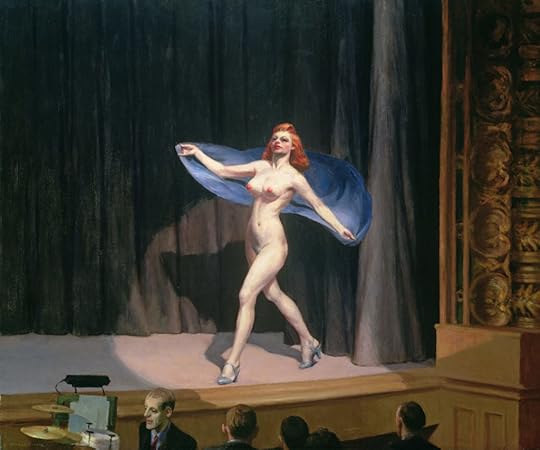
Girlie Show
By Megan Abbott
“She went udders out.”
“No pasties even?”
“Like a pair of traffic lights.”
Pauline hears them on the porch. Bud is telling her husband about a trip to New York City a few years ago. Going to the Casino de Paree.
Her husband says almost nothing, smoking cigarette after cigarette and making sure Bud always has a Blatz in hand from the metal cooler beside him.
“Nipples like strawberries,” Bud is saying. “But she never took off her g-string. And she never spread her legs.”
“That right?”
“Maybe you’ve seen things I ain’t.”
“Can’t say I know what you mean,” her husband says, flicking a match onto the lawn.
“Uh-huh.”
After, her husband comes inside, cheeks like dark flames.
The next day, she finds him in the kitchen, working, feet on the table.
It’s the first time he’s taken his sketch pad out in four months. Lately, he’s taken to give Pauline black looks when she came home from work at the ad agency, especially the time she wore the new beaver hat the man from Schmitt’s Fine Furs had given her for all her hard work.
But now, he is sketching frantically, and she doesn’t say a word or stand too close. They’ve been married fourteen years and she knows all his frets and stops, wood warps and sweet spots.
“But it’s so cold,” she says. It’s been so long since he’s asked her she almost thinks it might be some kind of joke.
He needs a model.
“Stand by the stove,” he says, rolling his shirt sleeves above his elbows. That angry vein in his forearm.
She moves over to the cook stove, its frill of heat.
The memory comes back to her, nearly fifteen years before. The coldest January she’d known. Cuddling up to the pot belly stove at the train station, she felt something pressing against her back. Turning, she saw a man behind her, hands deep in his coat pockets, red-cheeked.
She could smell Sen-Sen on his breath and the Macassar oil he used in his hair.
She was startled, but he was so handsome and she was twenty-seven, the only girl from her town without a husband.
They were married three months later.
My masher, she used to call him, affectionately, a very long time ago.
Sketch pad on his knees, he waits as Pauline pulls loose her housedress, unrolls her stockings.
The last is her underdrawers, which shiver to her feet.
“You’ll see all the things I don’t want you to see,” she whispers, throatily. She doesn’t know where this voice comes from.
Wifely duties, married intimacies have never been easy for her. Everything came as a great shock on her wedding night, even though she’d read Ideal Marriage: Physiology and Technique, the book her maid of honor, who’d already been married eighteen months and, as she whispered over creamed coffee at the luncheonette, was now as “looser than a wagon tire” down there.
Pauline hadn’t gotten as far in the book as she should have, or her Latin wasn’t good enough, because it turned out the thing her new husband liked to do most was more than two-hundred pages in, and the movements required, and the sounds he made, she could not find in the book at all.
The parts she liked were the accidental moments, often things she felt almost by accident while he was moving her, hands on her shoulders so rough she had marks like blue petals, and they recalled certain private moments when the subway train braked suddenly, coming to a long, shuddery stop.
Everything is off now, dress, stockings, slip, brassiere, step-ins and she is standing on the kitchen stool. She wonders if a very tall man might be able to see her through the pane above the kitchen curtains.
“Turn to your right.”
She can feel the gooseflesh rise, the veins behind her knees like tickling spiders now.
She is forty-two and no one has asked her to take off her clothes in a long time. (How about lunch, Mr. Schmitt said every time he called now. I’d love to see that beaver on you.)
As she turns, she lifts her breasts, which she’s always been proud of. No puling babies have ever hung from them and they have never fallen like a pair of yeast cakes, as some of the other women she knew confided. Once, Mrs. Bertrand, the head of the switchboard at the office asked if she could touch Pauline’s breasts, just to remind myself.
Catching a glimpse of herself in the chrome toaster, she smiles a little, but only to herself.
He makes her take many different poses, her arms high and twined like Marlene Dietrich, her legs apart, a boxer’s stance. Hand on hip, like a department store model, and knees bent, hands on hips, like a momma saying kootchie koo to a baby in a stroller.
“What is this for?” she finally asks, her back aching, her body tingling head to toe. “Am I dancer or something?”
“You’re not anything,” he says, coolly. “But the painting will be called the ‘Irish Venus.’”
She used to pose for him the first few years they were married, but only for his pay-work. She posed as an aproned housewife (Romance dies at the sight of dishpan hands!), a bathing beauty (Ten more pounds changed my life. A skinny girl hasn’t a chance!), a June bride, a beer hall girl in lederhosen. Eventually, once she started bringing in regular pay at the ad agency, where she drew herself all day (rows and rows of women’s shoes, or men’s hats, or children’s pajamas), he suggested he start hiring girls from the art school, but she resisted.
“Don’t be so jealous,” he would say.
“It’s the only time we spend together,” Pauline insisted, gently.
But then one time, she came home late from work, soon after her promotion.
The canvas on his easel was torn in half and he was gone to McCrory’s till four. When he finally returned, knocking over the milk bottles on the front step, he did some nasty things under their covers that she was required to be part of. She had to go to a doctor the next day and have some stitches put inside. Pushing through the train turnstile made her cry in pain.
He swore he didn’t remember any of it, but the following week, he hired a girl from the art school. She had buck teeth, but he said it worked out because she always kept her mouth shut.
##
Read the rest of Megan's story—and Jonathan's, and fifteen more by fifteen outstanding writers—in In Sunlight or in Shadow.
December 13, 2016
One Painting fromEdward Hopper. 1000 words from Michael Connelly.
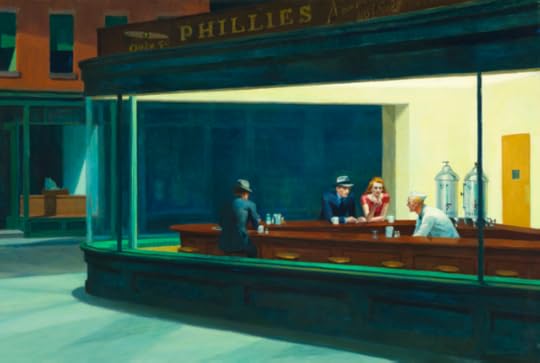
Nighthawks
by Michael Connelly
Bosch didn’t know how people in this place could stand it. It felt like the wind off the lake was freezing his eyeballs in their sockets. He had come totally unprepared for the surveillance. He had layers on but his top layer was an L.A. trench coat with a thin zip-in liner that wouldn’t keep a Siberian husky warm in the Chicago winter. Bosch wasn’t a man who gave much credit to clichés but he found himself thinking: I’m too old for this.
The subject of his surveillance had come down Wabash and turned south on Michigan, moving along Grant Park. Bosch knew where she was going because she had headed this way on her lunch break at the bookstore the day before as well. When she got to the museum she showed her member pass and was quickly admitted entrance. Bosch had to wait in line to buy a day pass. But he wasn’t worried about losing her. He knew where she would be. He didn’t bother to check his coat because he was cold to the bone, and he didn’t expect to be in the museum more than an hour – the girl would have to get back to the bookstore.
He moved through the galleries quickly on a direct route to the permanent Hopper exhibition. There he found her sitting on the one long bench. She had her notebook and pencil out and was already working. He had been surprised the day before to find she was not sketching in her notebook as she repeatedly glanced up and studied the painting. She was writing.
Bosch surmised that the Hopper painting was the biggest draw in the museum. Many people came for it and often carelessly stood in front her, blocking her view. She never cleared her throat to alert them. She never said anything. She sometimes leaned to her left or right to see around one of the blockers and Bosch thought he would see a slight smile on her lips, as though she were pleased with what the new angle of observation had brought her.
The lone bench was crowded with four Japanese tourists sitting in a row next to her. They looked like high school students come to study the master’s most well known work. Bosch took a position on the other side of the gallery, behind the surveillance subject’s back so she wouldn’t notice him. He rubbed his hands together and tried to get some warmth into them. His joints were aching from the cold and the nine-block walk to the museum. He had found no interior space with an angle on the front doors of bookstore. He had waited outside, hovering around the entrance to a garage, for her to emerge at lunchtime.
Bosch saw a spot on the opposite end of the bench come open when one of the students got up. He moved toward it, sitting down and using the three students between him and the surveillance subject as a blind. Without leaning forward and exposing himself he tried to look down the bench and possibly see what she was writing in her notebook. But she was writing with her left hand and that blocked his view.
He looked up at the painting when there was a moment the crowd cleared and it could be seen clearly. His eyes were drawn toward the man sitting alone at the counter, his face turned toward the shadows of the painting. There was a couple sitting across the counter from him. They looked bored. The man sitting alone was ignoring them.
“Iku jikan.”
Bosch turned his eyes from the painting. An older Japanese woman was signaling the sitting students impatiently. It was time to go. The two girls and a boy stood up and scurried out of the gallery to join the rest of their classmates. Their five minutes with the masterpiece were up.
That left Bosch alone on the bench with the subject of his surveillance. Four feet of space on the bench separated them. Bosch realized that sitting down had been a strategic mistake. She could get a good look at him if she looked away from the painting and her notebook. She might remember him if this lasted another day.
He didn’t move at first because that might draw her eye. He decided to wait two minutes and then get up. He would turn quickly away so she wouldn’t see his face. In the meantime, she did not seem to notice his presence and he went back to looking at the painting. He wondered about the painter’s choice to show the interior of the diner from the outside. To paint it from the shadows of night.
But then she spoke.
“Magnificent, isn’t it?” she asked.
“Excuse me?” Bosch asked.
“The painting. It’s pretty magnificent.”
“That’s what they say, yes.”
“Who are you?”
Bosch froze.
“What do you mean?” he asked.
“Which one of them do you identify with?” she said. “You’ve got the man by himself, the couple who don’t look all that happy to be there, and the man working behind the counter. Which one are you?”
Bosch turned from her to look at the painting.
“I’m not sure,” he answered. “How about you?”
“Definitely the loner,” she said. “The woman looks bored. She’s checking her nails. I’m never bored. It’s the one all alone.”
Bosch stared at the painting.
“Yeah, me too, I guess,” he said.
“What do you think the story is?” she asked.
“What, with them? What makes you think there’s a story?”
“There’s always a story. Painting is story telling. Do you know why it’s called Nighthawks?”
“No, not really.”
“Well, the night part is obvious. But check out the beak on the guy with the woman.”
Bosch did. He saw it for the first time. The man’s nose was sharp and bent like a bird’s. Nighthawks.
“I see it,” he said.
He smiled and nodded. He had learned something...
# # #
You can read the rest of Michael's story—and 16 other stories based on Edward Hopper paintings—in In Sunlight or in Shadow.
December 10, 2016
LB's Gifts for You and Yours...
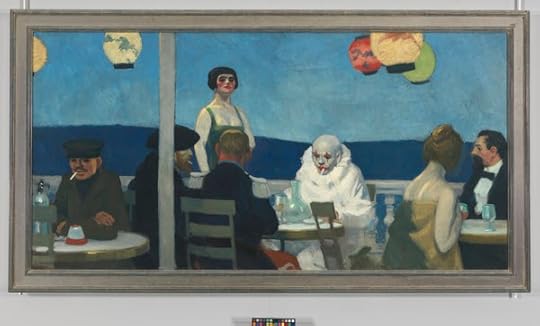
...and the Gift List begins with a picture: "Sour Bleu," painted by Edward Hopper in 1914. You know its proverbial value in verbiage, and we'll double it by adding the first 1000 words of the story Robert Olen Butler wrote for In Sunlight or in Shadow. Click here and sample a remarkable tale by a brilliant writer.We'll be sampling more stories, and showing you more paintings, as December rolls on. As we do, I'll tweet about it, and post on Facebook—but if you get in the habit of checking the website from time to time, you'll be sure to keep up.
Why don't I go ahead and buy the book? Wouldn't that be simpler?
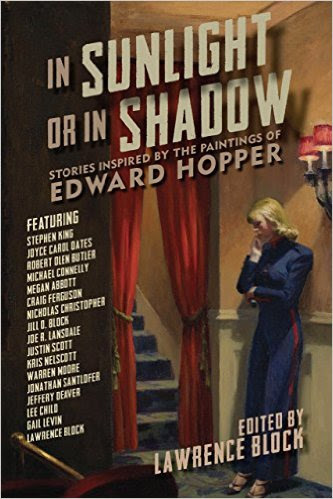 Now why didn't I think of that? Yes, of course—the simplest thing would be for you to buy the book, and I'm pleased to report that a lot of y'all have been doing just that. We had our two promotional events this week, Monday at the Whitney Museum, Tuesday at the Mysterious Bookshop, and both nights we played to capacity crowds and sold every book in the house, and—
Now why didn't I think of that? Yes, of course—the simplest thing would be for you to buy the book, and I'm pleased to report that a lot of y'all have been doing just that. We had our two promotional events this week, Monday at the Whitney Museum, Tuesday at the Mysterious Bookshop, and both nights we played to capacity crowds and sold every book in the house, and—Who's we?
You could call us the Unusual Suspects. I was joined by Megan Abbott, Jill Block, Lee Child, Nicholas Christopher, Gail Levin, Warren Moore, Joyce Carol Oates, and Jonathan Santlofer.
No wonder you filled all the seats and sold all the books.
Exactly. I gather In Sunlight or in Shadow is selling strongly nationwide—and in the UK, where Lee and Megan joined me on BBC Radio Four. Pegasus has a second printing on order, and the book's already featured on a batch of print and online Year's Best Gift Books roundups. At a list price of $25.95, this beautifully printed volume's a bargain, and you may be able to find it discounted; Amazon's still offering it at their pre-order price of $19.70.
I've ordered copies for everybody on my Christmas list. Well, the ones who can read, that is. But I wish there were some sort of deluxe limited printing—as a special gift for myself.
Something like this? A Special Deluxe Edition, limited to 750 copies, signed by me and published by Cemetery Dance. You can't have it by Christmas, as I haven't even received signature sheets yet, but it'll ship sometime in 2017 and should be sold out well in advance. Price is on the high side—$60, or $84.95 if you go for the custom slipcase. This won't be everybody's thing, but if it's yours...
Um, I'll be right back.
While she's gone, why don't I suggest some gifts for the rest of y'all? I think you know about Sinner Man, my long-lost first crime novel handsomely reissued by Hard Case Crime, and available in hardcover, paperback, ebook, or narrated by the Voice of Noir, Mike Dennis.
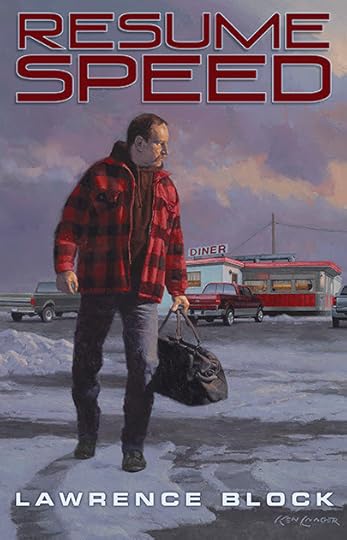 My novella Resume Speed came out some months ago as a bestselling Kindle Single, then found a new audience when voice artist Theo Holland brought its haunted protagonist brilliantly to life. And now Subterranean Press has let it blossom into a deluxe hardcover edition, a slender volume that's an eminently collectible gift. You can't have it in hand by Christmas, its release date is December 31, but if you want it I suggest you order it now. Subterranean's first editions are often sold out by the time they come off press, and it's rare for them to reprint.
My novella Resume Speed came out some months ago as a bestselling Kindle Single, then found a new audience when voice artist Theo Holland brought its haunted protagonist brilliantly to life. And now Subterranean Press has let it blossom into a deluxe hardcover edition, a slender volume that's an eminently collectible gift. You can't have it in hand by Christmas, its release date is December 31, but if you want it I suggest you order it now. Subterranean's first editions are often sold out by the time they come off press, and it's rare for them to reprint.And now some gift suggestions, all of them paperbacks which I've been able to self-publish; the editions are handsomely produced and the prices are modest. For writers: Write For Your Life, Writing the Novel from Plot to Print to Pixel, The Crime of Our Lives. Featuring Matthew Scudder: A Stab in the Dark, A Walk Among the Tombstones, A Long Line of Dead Men, The Night and the Music. Short stories: Catch and Release, Defender of the Innocent.
And then there's the Classic Crime Library: After the First Death, Ariel, Deadly Honeymoon, Cinderella Sims, Coward's Kiss, Not Comin' Home to You, Passport to Peril, Such Men Are Dangerous, The Specialists, The Triumph of Evil, You Could Call It Murder.
You're all out of breath.
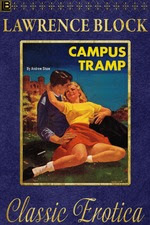 And I haven't even mentioned the Collection of Classic Erotica: 21 Gay Street, 69 Barrow Street, A Girl Called Honey, A Strange Kind of Love, A Woman Must Love, April North, Born to be Bad, Campus Tramp, Candy, Carla, Circle of Sinners, College for Sinners, Community of Women, Four Lives at the Crossroads, Gigolo Johnny Wells, High School Sex Club, I Sell Love, Kept, Of Shame and Joy, Sin Hellcat, So Willing, The Adulterers, and The Twisted Ones.
And I haven't even mentioned the Collection of Classic Erotica: 21 Gay Street, 69 Barrow Street, A Girl Called Honey, A Strange Kind of Love, A Woman Must Love, April North, Born to be Bad, Campus Tramp, Candy, Carla, Circle of Sinners, College for Sinners, Community of Women, Four Lives at the Crossroads, Gigolo Johnny Wells, High School Sex Club, I Sell Love, Kept, Of Shame and Joy, Sin Hellcat, So Willing, The Adulterers, and The Twisted Ones.Or the novels of Jill Emerson: Shadows, Warm and Willing, Enough of Sorrow, Thirty, Threesome, A Madwoman's Diary, The Trouble With Eden, and A Week as Andrea Benstock.
And how about some books in other languages? In German, for instance: Die Sünden der Väter und Drei am Haken. In Spanish: Matando a Castro, La noche y la música, Los ladrones no pueden escoger y El
 sicario. And in Italian: La notte e la musica.
sicario. And in Italian: La notte e la musica. That's 58 titles.
Really? I'll have to take your word for it. The links are to Amazon's US site, but you can find them on all Amazon platforms. And you'll encounter most of them at other online booksellers—BN.com, certainly—and occasionally on the shelves of brick and mortar bookstores.
Sell, sell, sell...
You sound disapproving.
Oh, it's nice to have all those books available, and I guess you have to make a living. But I miss the days when you used to give stuff away. See, I've got all this empty space on my Kindle....
I can help.
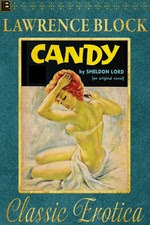 For the next seven days, from now until December 17, we're offering eight of my Kindle ebooks at the giveaway price of 99¢ apiece. From the Classic Crime Library, we've got a noir precursor to the Matthew Scudder series—After the First Death—along with my first hardcover crime novel—Deadly Honeymoon—and Ariel, a Charleston-based thriller about an adoption gone wrong.
For the next seven days, from now until December 17, we're offering eight of my Kindle ebooks at the giveaway price of 99¢ apiece. From the Classic Crime Library, we've got a noir precursor to the Matthew Scudder series—After the First Death—along with my first hardcover crime novel—Deadly Honeymoon—and Ariel, a Charleston-based thriller about an adoption gone wrong.The Collection of Classic Erotica supplies April North and Gigolo Johnny Wells, as well as two titles that could as easily be labeled noir crime novels, Candy and Four Lives at the Crossroads.
That's seven.
It is, but I'm not done yet. Last—and also least—is Keller on the Spot. It's least in terms of length, as it's a short story while the others are all novels, but it's the only one of the lot to win an Edgar. And it'll cost you a mere 99¢ for the next seven days.
What's the catch?
 I'm afraid it's exclusive to the US platform, amazon.com. Although we did find a way to offer the deal to Kindlers with access to amazon.co.uk, though at the slightly higher price of 99p. Here are the links that'll work on your side of the pond: After the First Death - Deadly Honeymoon - Ariel - April North - Gigolo Johnny Wells - Candy - Four Lives at the Crossroads - Keller on the Spot. NB: Special prices in the UK won't kick in until December 11, and will run a day longer, through the 18th.
I'm afraid it's exclusive to the US platform, amazon.com. Although we did find a way to offer the deal to Kindlers with access to amazon.co.uk, though at the slightly higher price of 99p. Here are the links that'll work on your side of the pond: After the First Death - Deadly Honeymoon - Ariel - April North - Gigolo Johnny Wells - Candy - Four Lives at the Crossroads - Keller on the Spot. NB: Special prices in the UK won't kick in until December 11, and will run a day longer, through the 18th.Remarkably enough, I have more things to report, including news of an indie film in the works based on one of my earliest pulp short stories. (Oh, why be a tease? The story's Bride of Violence, you can read it in One Night Stands and Lost Weekends, and here's the film's Facebook page.)
And that's enough. Let me draw this to a close by wishing you and yours all the joys of the season—along with the purely altruistic hope that some of my books may be a part thereof.
Cheers,

PS: As always, please feel free to forward this to anyone you think might find it of interest. And, if you've received the newsletter in that fashion from a friend and would like your own subscription, that's easily arranged; a blank email to lawbloc@gmail.com with Newsletter in the subject line will get the job done.
LB's Blog and Website
LB's Facebook Fan Page
Twitter: @LawrenceBlock



